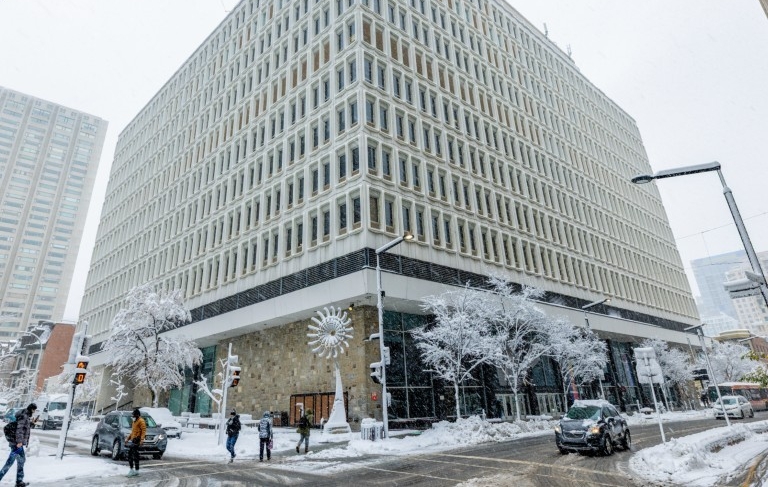Board of Governors and Senate highlights: November 2025

President Graham Carr began his remarks at the October 30 Board of Governors meeting and November 7 Senate meeting by thanking all the staff, faculty and students who made the recent Open House a success, adding that the university welcomed some 5,700 visitors. He also thanked all those who participated in the fall Convocation ceremonies, where 2,000 students graduated.
At Senate, he mentioned a few recent successes by members of the Concordia community:
- Alumna Sophie Jodoin won the inaugural Prix La Caisse en art actuel. The $25,000 award supports mid-career Quebec artists.
- Three more Concordia graduates were recognized with an Emmy Award, bringing this year’s total to six.
- Five Concordia graduates made this year’s list of Governor General's Literary Awards finalists.
- The university recently launched a five-week French-language and arts immersion summer program in Charlevoix for Fine Arts students, in partnership with the Musée d’art contemporain de Baie- Saint-Paul.
Updates to immigration policies
Carr congratulated the candidates elected to office in the November 2 municipal election, in particular in the two boroughs where the Concordia campuses are located.
He then spoke about the federal budget presented on November 4, welcoming the announcement of additional investments in the research councils and the recruitment of researchers, as well as of infrastructure funding for which universities will be eligible. The federal government nevertheless announced a sharp reduction in the number of immigrants it will admit to Canada, including international students, though it is committing to processing PhD study permit applications within 14 days. It is also prepared to exempt graduate students from its reduced immigration quotas, as well as those looking to extend their stay, elements that are however dependent on the Quebec government doing the same.
Carr said he had spoken at the hearings the provincial government held on immigration planning a few weeks earlier. All the universities had the same message, he pointed out, and that is that the policies implemented over the past two years had been “extremely damaging for the university sector”. Regardless, the Quebec government announced on November 6 the elimination of the Programme de l’expérience québécoise, a pathway toward permanent residency that had been “a major incentive for students to study in Quebec”, the president said, expressing his concern at the decision. The government also announced it would prioritize immigration in regions outside Montreal and Laval.
More cost-reduction measures needed, but range of options shrinking
At the Board meeting, Chief Financial Officer Denis Cossette presented the last audited financial statements, confirming that the university managed to meet for 2024-2025 the deficit target of its multi-year financial recovery plan. Income generated by ancillary services and the Concordia University Inter-generational Fund helped, as did the many efforts made across the university to contain expenses. But this success “does not reduce the challenges for the future”, Cossette warned.
Carr told both assemblies that although new registrations at Concordia for this year had gone up by 7.1 per cent compared to last year, the university’s total enrolment had nevertheless decreased, due to the severe drop in international applications and registrations. The university has 4,000 fewer international students this year than it did in 2022-2023, before the introduction of the new government policies on tuition fees and immigration. In addition to “a dramatic change in the composition of our student body”, the president said this fall has led to drastic financial consequences. “The government policies have inflicted a major shock to our system of financial planning and budget management.”
President Carr explained to senators that in addition to the reduced revenue linked to falling enrolment, the provincial government has frozen operating grants this year and next. “There is no new capacity to meet inflation and salary [increase] costs while our revenues continue to decline.” He provided some history around the financial recovery plan, which was approved by the government of Quebec, and detailed the serious consequences the university would face from a governance perspective should it fail to meet the targets set in the plan.
Carr added that not only has the university not yet reached its targeted deficit for this year, it will need to find a further $45M in savings or new revenue for 2026-2027. He outlined the many measures already implemented over the past couple of years, mainly in the non-academic sector, including reductions in the size of the administrative staff complement. “The decisions we face will become harder as our range of available options shrinks over time.”
Referring to the recently announced decisions to cancel the annual call for limited-term academic appointments (LTA) for next year and deferring sabbatical applications by one year, he said that “both decisions underline the very thin range of choices that our deans have to work with in terms of managing budget and academic mission”.
A number of senators expressed their concern over the decision around LTAs, highlighting the contributions of these faculty members to teaching and sharing testimonials from colleagues and students.
Academic decisions at Senate
Finally, Senate approved a couple of motions proposing changes to academic programs:
- The Faculty of Arts and Science proposed a modification to the admission profile for the Department of Psychology’s Neuroscience program, requiring CEGEP students to have the equivalent of MATH 204 Vectors and Matrices.
- The Faculty of Fine Arts introduced the second of a three-step review of its music programs. This step consists of changes to the curricular structure, as part of the review’s orientation shift to decenter teaching from the Western classical canon and encourage transversal knowledge acquisition. The changes are aimed at facilitating student progression and better preparing them for the music industry.




